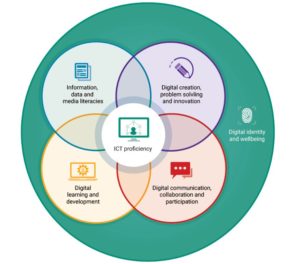Digital capabilities refer to ‘the capabilities which fit someone for living, learning and working in a digital society’ (Jisc, 2015). The term broadens what was initially discussed under ‘digital literacy’ and is now seen to encompass more than just students, taking into account other roles within the educational sector such as academic and professional services staff (Masterman, 2016).
Learn more about digital capabilities.
The University of Derby utilises the digital capabilities framework developed by Jisc, identifying 6 elements which make up different aspects of a person’s digital capabilities.
- ICT Proficiency
- Information, data and media literacies
- Digital creation, problem solving and innovation
- Digital learning and development
- Digital communication, collaboration and participation
- Digital identity and wellbeing
The six elements are defined by Jisc with details provided of how to use the framework. The image below shows how each of the elements link to each other, with skills around ICT proficiency at the heart and digital identity and wellbeing relevant to all the elements within the framework.

Jisc and Beetham – Shared under CC BY-NC-SA
How can I develop my digital capabilities?
The university has a commitment to support both students and all staff to develop their digital capabilities (TEL Strategy, 2017). This is especially important for academic staff with teaching excellence linked closely to being digitally capable, as seen in this 2016 research publication from the QAA and the UKPFS K4 (the use and value of appropriate learning technologies(.
Jisc have provided a number of useful profiles for staff in key roles detailing relevant digital capabilities focused on the nature of their work. The profiles have been mapped to a number of relevant professional frameworks and a specific digital lens has been developed with the Higher Education Academy (HEA) for the UKPSF.
- HE teacher (pdf) – UoD Specific
- FE and skills teacher (pdf)
- Researcher (pdf)
- Learner (pdf) – UoD Specific
- Library and information professionals
- Professional services staff in education – UoD Specific
A good place to start is to complete the Digital Capabilities course on My Learning (find this under the My Courses section and then Digital Capabilities) or the Jisc digital capability discovery tool. This will help you to identify areas of strength and areas for development.
There are a number of ways to gain support with developing your digital capabilities. These include:
- Access the Derby Digital Practice Handbook
- Book an induction for learning technology with your College Learning Technology Advisor
- Book on staff development events advertised around the University.
- Take an online course such as those for developing your skills using Microsoft Educator Community – just login using your University Office365 account. There are also FE and HE pages.
- Request bespoke or team training through your College Learning Technology Advisor
- Read case studies from across the University on the Ideas Factory
How can I help my student’s develop their digital capabilities?
A useful place to start is to look at the typical digital capabilities outlined in the Learner profile from Jisc, where the digital capabilities are broken down into the six elements. However, it could be that some of these areas are more important for your students than others and what these are, will largely depend upon the subject they are studying as well as their career or life aspirations. Jisc have given permission for these digital capabilities to be adapted so you might create your own list of the digital capabilities of graduates from your programme.
It is also a good idea to get them to complete the Digital Skills for employment online course or the Jisc Discovery Tool which will help them to reflect on how confident they are about aspects of their digital capabilities. This is a really good induction activity and can help provide input into an ongoing development portfolio.
There are a number of ways you can help students to develop their digital capabilities. These include:
- Embedding digital practices in a programme of study to provide students with opportunities to take part in digital experiences.
- Talk to employers about the types of digital capabilities they expect their staff to have and embed activities which help students to develop these skills in their programme.
- Embed digital capabilities in learning outcomes helping students to see how these skills are developed as part of their programme.
- Encourage students to look at taking Microsoft Certification to improve their skills and gain accreditation for this.
- Work with students as partners to involve them in helping to pass on their digital capabilities to fellow students.
- Encourage students to use digital tools respectfully and safely making them aware of online safety and ethical issues.
- Sign post them to University support services which can help them to develop their skills including the Study Skills Service, IT Helpdesk, Careers and Employment Service or opportunities through Derby’s Union of Students.
- Encourage the development of peer networks where students can share ideas and opportunities to develop their skills.
If you would like any help with looking at how you could embed digital practices within your programme or module or would like further support and advice about developing your students digital capabilities then please contact your College Learning Technology Advisor.
References
Jisc (2015). Developing students’ digital literacy [online], available from https://www.jisc.ac.uk/guides/developing-students-digital-literacy [accessed 12 April 2017]
University of Derby’s Technology-Enhanced Learning Strategy 2017-2021
